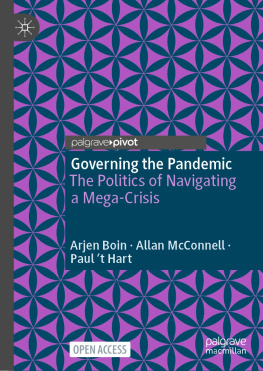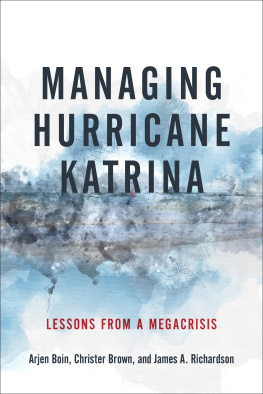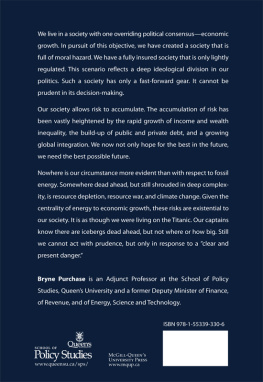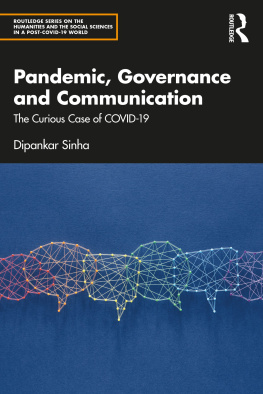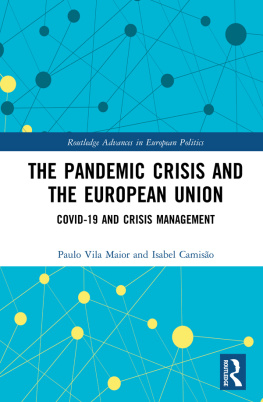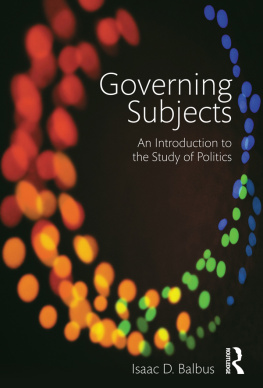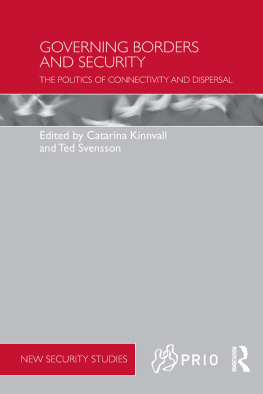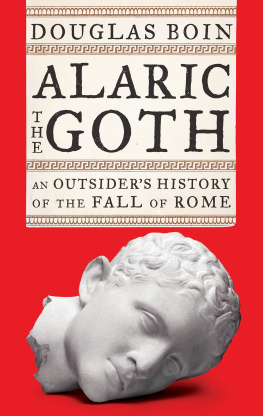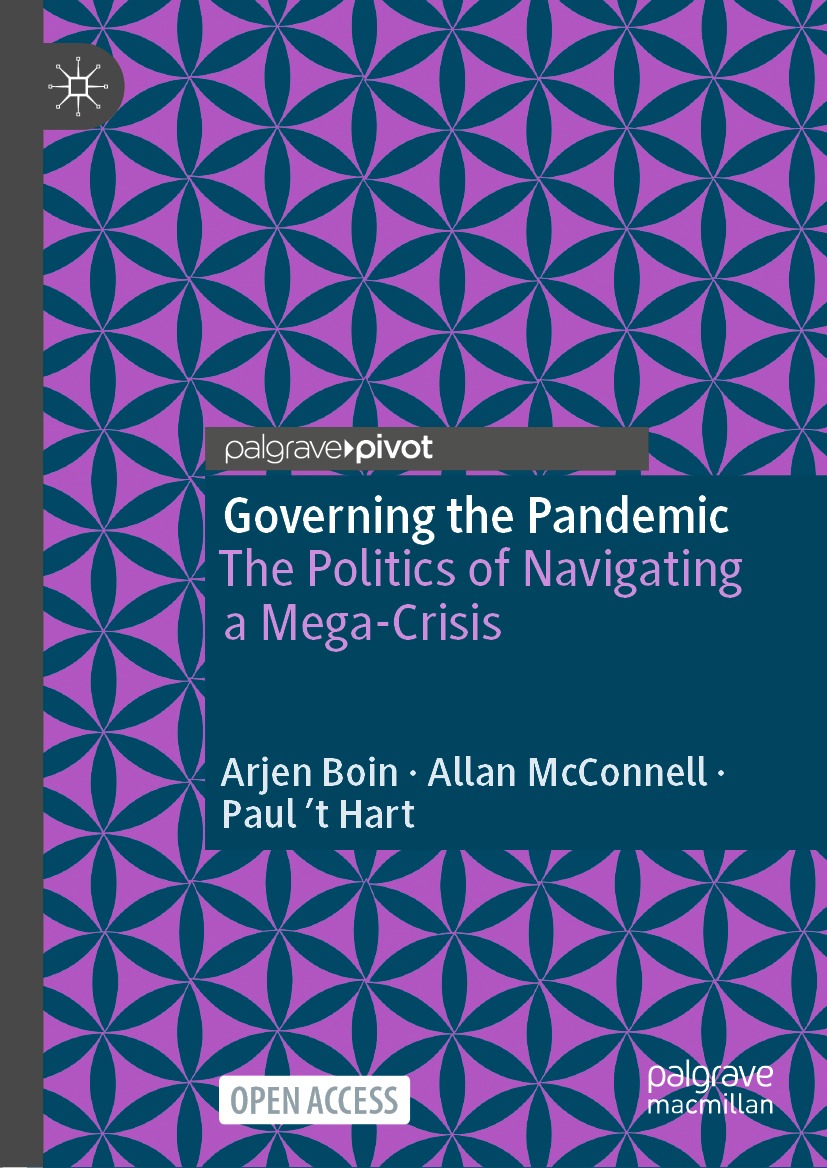Arjen Boin
Department of Political Science, Leiden University, Leiden, The Netherlands
Allan McConnell
Department of Government and International Relations, University of Sydney, Darlington, NSW, Australia
Paul t Hart
School of Governance, Utrecht University, Driebergen-Rijsenburg, Utrecht, The Netherlands
ISBN 978-3-030-72679-9 e-ISBN 978-3-030-72680-5
https://doi.org/10.1007/978-3-030-72680-5
This book is an open access publication.
The Editor(s) (if applicable) and The Author(s) 2021

Open Access This book is licensed under the terms of the Creative Commons Attribution 4.0 International License ( http://creativecommons.org/licenses/by/4.0/ ), which permits use, sharing, adaptation, distribution and reproduction in any medium or format, as long as you give appropriate credit to the original author(s) and the source, provide a link to the Creative Commons license and indicate if changes were made.
The images or other third party material in this book are included in the book's Creative Commons license, unless indicated otherwise in a credit line to the material. If material is not included in the book's Creative Commons license and your intended use is not permitted by statutory regulation or exceeds the permitted use, you will need to obtain permission directly from the copyright holder.
The use of general descriptive names, registered names, trademarks, service marks, etc. in this publication does not imply, even in the absence of a specific statement, that such names are exempt from the relevant protective laws and regulations and therefore free for general use.
The publisher, the authors and the editors are safe to assume that the advice and information in this book are believed to be true and accurate at the date of publication. Neither the publisher nor the authors or the editors give a warranty, expressed or implied, with respect to the material contained herein or for any errors or omissions that may have been made. The publisher remains neutral with regard to jurisdictional claims in published maps and institutional affiliations.
Cover illustration: Melisa Hasan
This Palgrave Pivot imprint is published by the registered company Springer Nature Switzerland AG
The registered company address is: Gewerbestrasse 11, 6330 Cham, Switzerland
Preface
For long-time students of crisis management, COVID-19 is the big onethe scary Future Crisis so often announced and discussed in the literature: truly global, arriving slowly and lasting for a very long time, with devastating impacts. COVID-19 was the ultimate stress test for plans and preparations, for political and administrative leadership, for societal and institutional resilience.
In this book, we wield the tools of crisis studies to understand and explain the dynamics of governmental and societal responses during the first twelve months of this crisis. This is not a detailed case study with timelines and statistics. Our focus is on how governments, particularly those of the advanced economies (that we are most familiar with) have responded to the pandemic, to the complex, transboundary multi-crises it has generated, and the ways publics reacted to the various responses.
To write a book about COVID-19 while it is still unfolding is an inherently premature endeavour. The pandemic is still with us. The long shadow it will cast on our societies is only beginning to form. Much about what has happened behind the scenes of political decision-making and public sector performance remains unknown. It is therefore inevitable that some of our findings and interpretations in this book will need to be nuanced or revised as new information emerges.
Yet, we think it is important to take a good lookfrom the balconyat the governance of this crisis while it is unfolding. Governments and scholars cannot afford to begin the work of reflecting and learning until this crisis is truly over, which may be years from now. Future crises are in the making. We need to get ready. We need to learn what we can, as soon as we can. This book is intended to provide fuel for such a discussion.
We offer a synthesis of what we believe to be the four main challenges that all governments face in a crisis of this magnitude: they must make sense of a highly uncertain and dynamic threat; get things done in the face of collective action problems; craft credible narratives about deeply unsettling events; and work towards closure of a crisis that has the potential of destabilizing our societies and their political systems. In the final chapter, we offer some preliminary directions for the deep institutional learning required to make our communities and our governance systems more resilient when the next big one comes along.
We have made liberal use of the quick-response analyses published by social science colleagues around the world. Together, they covered most all dimensions of the responses of governments, political systems and societies. These scholars have provided a strong evidence base, while addressing a swathe of crisis management and public governance themes. We thankfully build on this body of work.
We are particularly thankful to our research assistants, Marte Luesink and Friso Welten, who have done excellent work (ranging from desk research to the final commas in the bibliography).
Arjen Boin
Allan McConnell
Paul t Hart
Leiden, The Netherlands Sydney, Australia Utrecht, The Netherlands
January 2021
Contents
List of Tables
The Author(s) 2021
A. Boin et al. Governing the Pandemic https://doi.org/10.1007/978-3-030-72680-5_1
1. The Year of the Unthinkable
Arjen Boin
(1)
Department of Political Science, Leiden University, Leiden, The Netherlands
(2)
Department of Government and International Relations, University of Sydney, Darlington, NSW, Australia
(3)
School of Governance, Utrecht University, Driebergen-Rijsenburg, Utrecht, The Netherlands
Arjen Boin (Corresponding author)
Email:
Abstract
COVID-19 brought the unthinkable to our doorstep. The pandemic caused a series of global, and interconnected, health, economic, social, institutional and political crises that are unprecedented in living memory. Political leaders struggled to contain the virus and persuade anxious, weary citizens to behave this or that way in order to overcome a giant collective action problem. This chapter is a primer for the detailed examination of political and policy responses to this impossible challenge. It describes pivotal governance challenges and the constraints operating on the crisis response.

